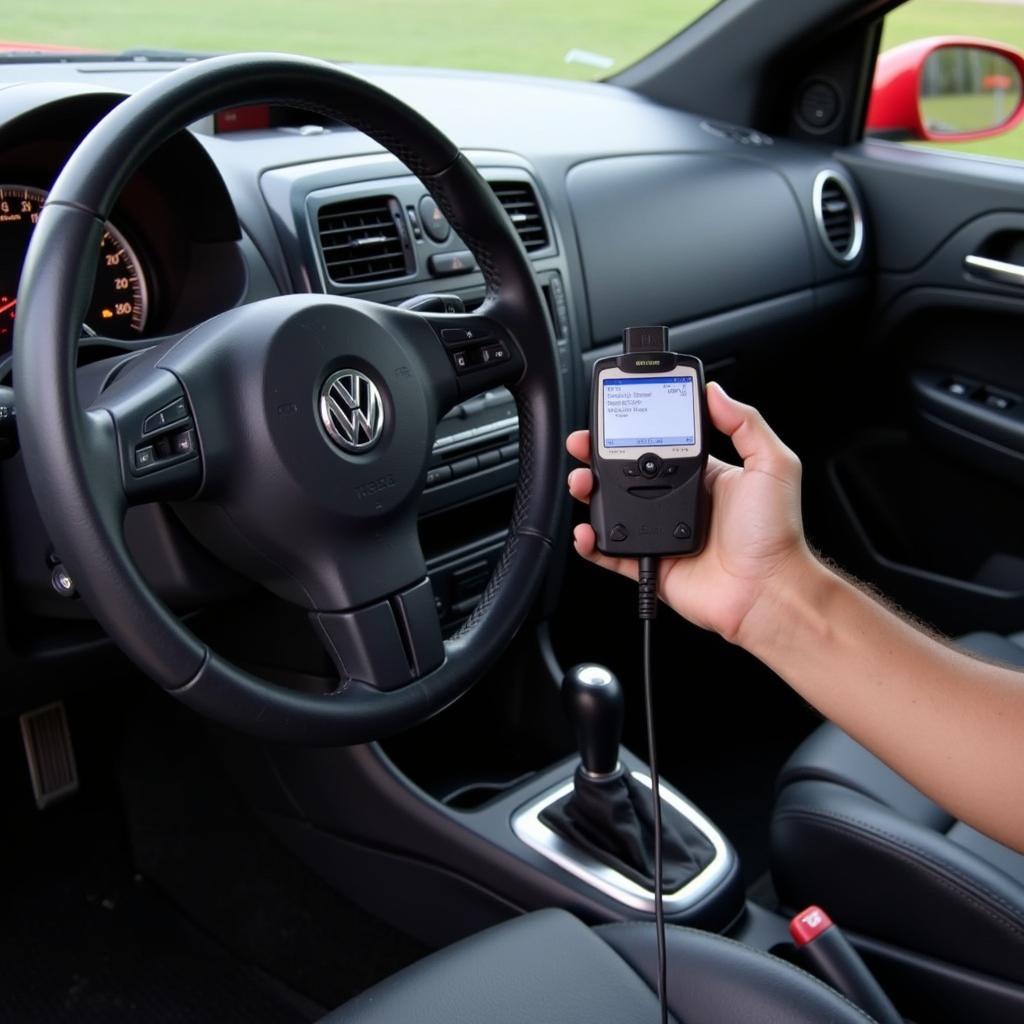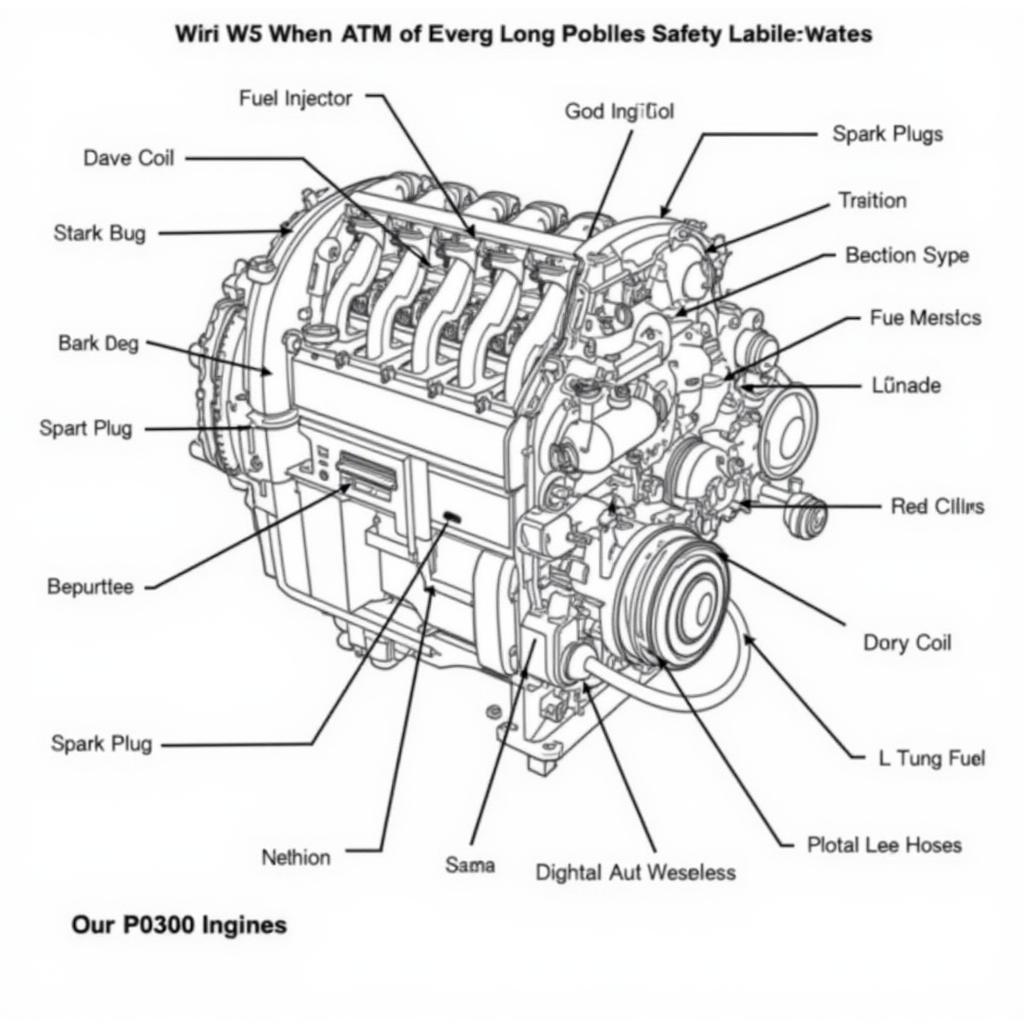Your cart is currently empty!

2006 VW New Beetle Code P0300: How to Find the Problem
The dreaded P0300 code on your 2006 VW New Beetle. It signals a random/multiple cylinder misfire, which can be a real headache. But don’t worry, this guide will walk you through diagnosing and fixing the problem, saving you time and money. We’ll cover everything from the simple checks to the more complex diagnostic procedures, empowering you to tackle this issue head-on.
Understanding the P0300 Code in Your 2006 VW New Beetle
The P0300 diagnostic trouble code (DTC) indicates a random misfire. This means the engine’s computer has detected misfires in multiple cylinders, or the misfires are jumping around. Unlike codes like P0301 (cylinder 1 misfire), P0300 is a bit trickier to pinpoint, as it doesn’t isolate a specific cylinder. This often leads to a bit more detective work to uncover the root cause. Why does this happen? Several culprits could be at play, including spark plugs, ignition coils, fuel injectors, vacuum leaks, or even more serious issues like a faulty catalytic converter or low compression.
Common Causes of P0300 in a 2006 VW New Beetle: A Quick Checklist
Before diving into the more advanced diagnostics, let’s cover some of the most common and easily checked causes of the P0300 code:
- Spark Plugs: Worn or fouled spark plugs are a frequent offender. Check their condition and replace them if necessary. They’re relatively inexpensive and easy to replace.
- Ignition Coils: A failing ignition coil can cause misfires across multiple cylinders. Check for cracks or damage and test their resistance with a multimeter.
- Fuel Injectors: A clogged or malfunctioning fuel injector can starve a cylinder of fuel, leading to a misfire. You can use a fuel injector cleaner or have them professionally tested.
- Vacuum Leaks: A leak in the intake system can disrupt the air-fuel mixture, causing random misfires. Inspect hoses and connections for cracks or loose fittings.
How to Find the Problem: A Step-by-Step Guide for your 2006 VW New Beetle Code P0300
- Check the Basics: Start with the easy stuff! Inspect your air filter, make sure your gas cap is tight, and verify your battery connections are secure. These simple checks can sometimes resolve the issue.
- Scan for Codes: Use an OBD-II scanner to confirm the P0300 code and check for any other accompanying codes. These additional codes can provide valuable clues.
- Inspect Spark Plugs and Wires: Examine the spark plugs for wear, fouling, or damage. Check the wires for cracks or burns. Replace as needed.
- Test Ignition Coils: Use a multimeter to test the resistance of the ignition coils. Compare your readings to the manufacturer’s specifications.
- Check Fuel Injectors: Consider using a fuel injector cleaner or having the injectors professionally tested. A faulty injector can cause a lean condition and lead to misfires.
- Inspect for Vacuum Leaks: Use a smoke machine or a can of carburetor cleaner to check for vacuum leaks. Listen for changes in engine idle while spraying around potential leak points.
Advanced Diagnostics for P0300 on a 2006 VW New Beetle
If the basic checks don’t reveal the culprit, you might need to delve into more advanced diagnostics. These can include:
- Compression Test: This test measures the pressure in each cylinder and can identify internal engine problems like worn piston rings or damaged valves.
- Fuel Pressure Test: A low fuel pressure can cause random misfires. This test checks the fuel pump and fuel filter for proper operation.
- Catalytic Converter Check: A clogged or failing catalytic converter can also trigger a P0300 code.
Expert Insights on Dealing with P0300 Codes
“Don’t underestimate the importance of regular maintenance. Fresh spark plugs and clean fuel injectors can go a long way in preventing misfires.” – John Miller, ASE Certified Master Technician
“A vacuum leak can be tricky to find. Using a smoke machine is the most effective way to pinpoint its location.” – Maria Sanchez, Automotive Diagnostics Specialist
 2006 VW New Beetle OBD-II Scanner
2006 VW New Beetle OBD-II Scanner
Conclusion: Tackling that P0300 Code in your 2006 VW New Beetle
The P0300 code in your 2006 VW New Beetle can seem daunting, but by following this guide and using a systematic approach, you can pinpoint the problem and get your car running smoothly again. Remember to start with the basics and move on to more advanced diagnostics as needed. If you need expert assistance, feel free to connect with us at VCDSTool at +1 (641) 206-8880 and our email address: vcdstool@gmail.com or visit our office at 6719 W 70th Ave, Arvada, CO 80003, USA.
 VW New Beetle Engine Diagram
VW New Beetle Engine Diagram
FAQ: Common Questions About the P0300 Code
- Can I drive my car with a P0300 code? While you can technically drive a short distance, it’s not recommended. Continued driving with a misfire can damage your catalytic converter and other engine components.
- Is the P0300 code serious? It can be. While it might be a simple fix like spark plugs, it could also indicate more serious internal engine problems.
- How much does it cost to fix a P0300 code? The cost varies depending on the cause. Spark plugs are inexpensive, but a catalytic converter replacement can be costly.
- What is the difference between P0300 and P0301? P0300 indicates random or multiple misfires, while P0301 specifically points to a misfire in cylinder 1.
- Can bad gas cause a P0300 code? Yes, contaminated or old fuel can cause misfires.
- Will a tune-up fix a P0300 code? A tune-up that includes new spark plugs, wires, and other maintenance items can often resolve the issue, especially if it’s related to regular wear and tear.
- What tools do I need to diagnose a P0300 code? An OBD-II scanner, a multimeter, and basic hand tools are a good starting point. More advanced diagnostics might require specialized tools like a compression tester or smoke machine.
by
Tags:
Leave a Reply